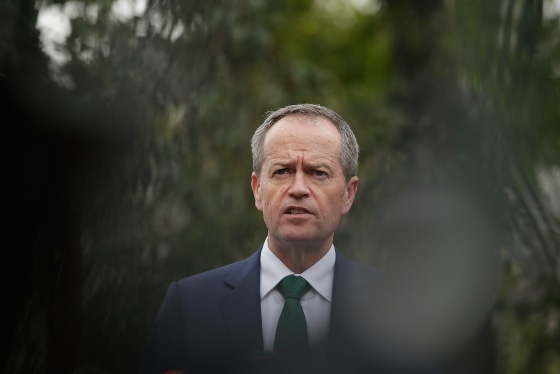CANBERRA, Australia — Australia's opposition said Tuesday that it would test Prime Minister Malcolm Turnbull's weakened grip on power following last month's general election by proposing its own legislation to legalize gay marriage.
Opposition leader Bill Shorten used the first meeting of Parliament since the election to announce that he would propose the bill on Wednesday.
The bill underscores a stark policy difference between the conservative government and the opposition center-left Labor Party on gay marriage.
While Labor wants Parliament to decide the divisive issue quickly, the government wants to first hold a popular vote on whether the public thinks Parliament should create marriage equality.
Dismayed gay rights advocates warn that a stalemate over how to proceed could mean there is no vote on gay marriage before the next election is due in 2019.
Turnbull's authority was undermined by the election, which cost his government 14 seats and left it with a single-seat majority in the House of Representatives.
RELATED: Australia Same-Sex Marriage Vote Hits Stumbling Block
Government lawmakers are also divided on whether gays should be allowed to marry and the wisdom of holding a 160 million Australian dollar ($120 million) opinion poll known as a plebiscite.
Labor will need the support of 76 of the 150 lawmakers in the lower chamber on Wednesday for debate on its gay marriage bill to start. Labor has only 69 seats, so it will rely on government lawmakers to break ranks from the ruling coalition, as well as the backing of up to five independent lawmakers.
Labor gained the power to veto the plebiscite after two balance-of-power minor parties said they would not support enabling legislation in the Senate, where the government holds a minority of seats.
All three parties are in favor of gay marriage, but argue that the plebiscite is a waste of money, and that government-funded advertising of arguments for and against same-sex marriage could give legitimacy to homophobic views.
Turnbull agreed to hold the plebiscite in a deal with gay marriage opponents within his party. In return, those opponents backed Turnbull in an internal leadership ballot that toppled Prime Minister Tony Abbott a year ago.
Turnbull, a gay marriage advocate, had previously spoken out against such a public vote that could create painful divisions in Australian society.
Gay marriage lobbyists are generally opposed to the plebiscite, which they argue was initiated by lawmakers who hope it fails.
Opinion polls show that most Australians support same-sex marriage.
But plebiscites and referendums — which are legally binding popular votes — rarely manage to change the status quo in Australia.
Some marriage equality advocates warn that a lost plebiscite could likely set back their cause for decades.
